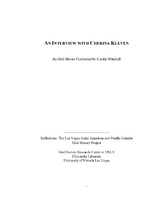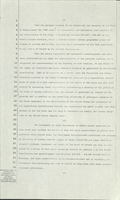Search the Special Collections and Archives Portal
Search Results

Cherina Kleven oral history interview: transcript
Date
Archival Collection
Description
Oral history interview with Cherina Kleven conducted by Cecilia Winchell on June 9, 2021 for Reflections: The Las Vegas Asian American and Pacific Islander Oral History Project. Cherina Kleven talks about her family and childhood growing up in Taiwan amongst six siblings. She shares her family's history and how they immigrated to Las Vegas while she was a teen, as well as her employment history and how she met her husband. Cherina talks about racial and gender discrimination and the obstacles she has overcome to be the only working female in her family, the only woman firefighter at her station house, and the first female Asian American Assistant Fire Chief in the United States.
Text
Dorothy Dorothy Papers
Identifier
Abstract
The Dorothy Dorothy papers (approximately 1913-1986) document the life of singer, songwriter, columnist, pilot, and farmer, Dorothy Dorothy. Materials contain genealogy records, correspondence, business and organizational records, local history, sheet music, artifacts, and two boxes of photographic prints. Also included are materials relating to her active involvement with animal rights campaigns.
Archival Collection

Charles Guy interview, 1995: transcript
Date
Archival Collection
Description
Guy begins by talking about his birth in Brazil, Indiana, his early work selling Civilian Conservation Corps magazine subscriptions, and his travels across the United States before arriving in Boulder City, Nevada in 1938. Next, Guy recalls his early memories of Boulder City, the Las Vegas Wash, and his work at the Boulder Beach campgrounds at Lake Mead Recreation Area and in Overton, Nevada. Guy also discusses the campgrounds' working conditions, entertainment, access to amenities, and work associates. Afterwards, Guy talks about his time as a railroad worker in Indiana and Las Vegas, Nevada, Block 16 in Las Vegas, Las Vegas entertainers, working as a volunteer fire fighter, and anecdotes about people in his personal life.
Text

Transcript of interview with Harold R. Hunter by Philip John Mile, March 19, 1978
Date
Archival Collection
Description
On March 19, 1978, Philip John Mile interviewed former chef, Harold R. Hunter (born 1901 in Norwich, Kansas) about his life in Southern Nevada. Hunter discusses his different experiences working in early Las Vegas restaurants during the thirties and forties. Hunter also discusses the rapid growth of the Mormon community during this time.
Text

Cecia Alvarado oral history interview: transcript
Date
Archival Collection
Description
Oral history interview with Cecia Alvarado conducted by Barbara Tabach on September 15, 2020 for the Latinx Voices of Southern Nevada Oral History Project. Cecia describes her personal history, moving to the United States as a teen in the year 2000. She talks of immigration, education, and her work as the State Director of "Mi Familia Vota."
Text

Edith Fernandez oral history interview: transcript
Date
Archival Collection
Description
Oral history interview with Edith Fernandez conducted by Marcela Rodriguez-Campo and Claytee D. White on September 27, 2018 for the Latinx Voices of Southern Nevada Oral History Project. In this interview, Fernandez discusses her upbringing in Las Vegas, Nevada and growing up in the Charleston Heights neighborhood. She recalls living in a predominantly white community, and the growth of Latinx families in that area. Fernandez talks about her educational experience in the city, her father's involvement with Culinary Worker Union Local 226, and identifying as a Chicana American. Later, Fernandez remembers her involvement with opening the Cambridge Center, working with the Latino Youth Leadership Conference (LVLC), and becoming the District Director for Representative Steven Horsford. Lastly, Fernandez discusses her role as the Associate Vice President at Nevada State College (NSC).
Text

Erma Linda Rivera oral history interview: transcript
Date
Archival Collection
Description
Oral history interview with Erma Linda Rivera conducted by Laurents Bañuelos-Benitez, Nathalie Martinez, Maribel Estrada Calderón, and Barbara Tabach on January 09, 2019 for the Latinx Voices of Southern Nevada Oral History Project. In this interview, Erma Linda Rivera discusses her early life as a grandchild of immigrants. She shares her experiences growing up in a mining town in Arizona. After marrying, both Erma Linda and her husband Jose became federal civil servants. This would lead Erma Linda Rivera to Las Vegas, Nevada in 1984. Prior to retirement, Rivera worked as an regional Equal Employment Opportunity manager. Rivera discusses her career working for the Department of the Interior, sharing how her job helped fuel her passion for social justice. Erma Linda relates the importance of civic involvement in her life. Finally, she reflects on how Henderson, Nevada has changed over the years she has lived there.
Text


